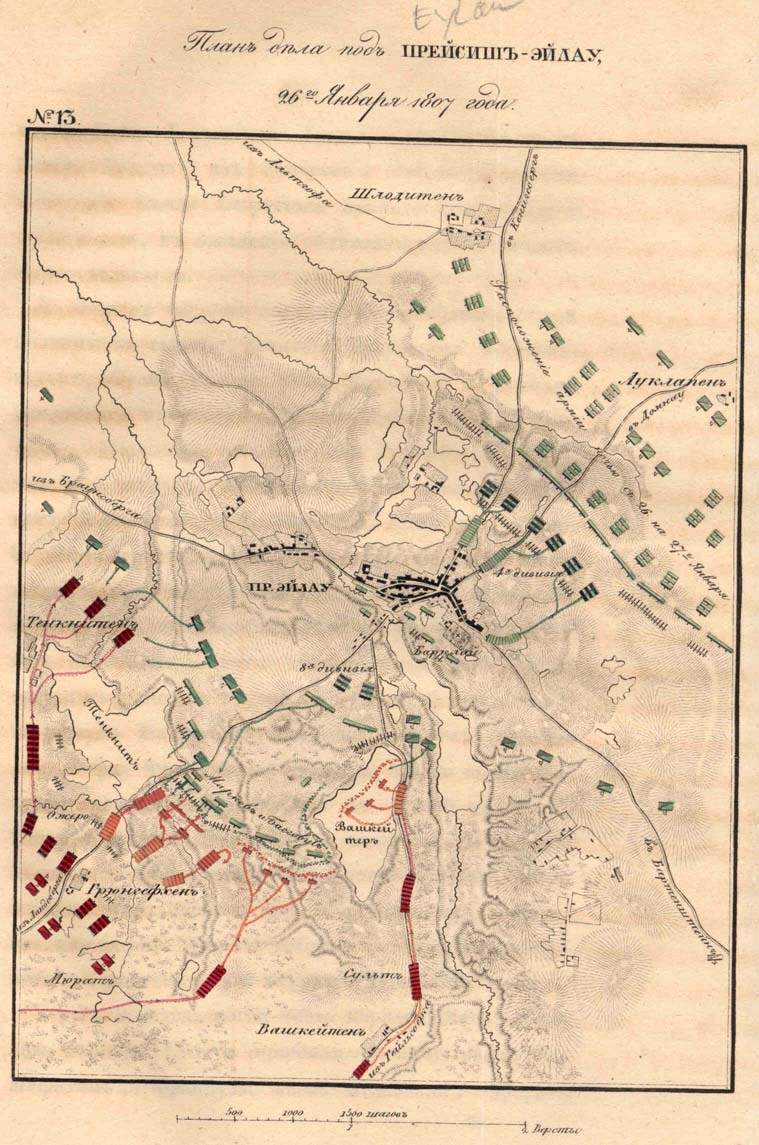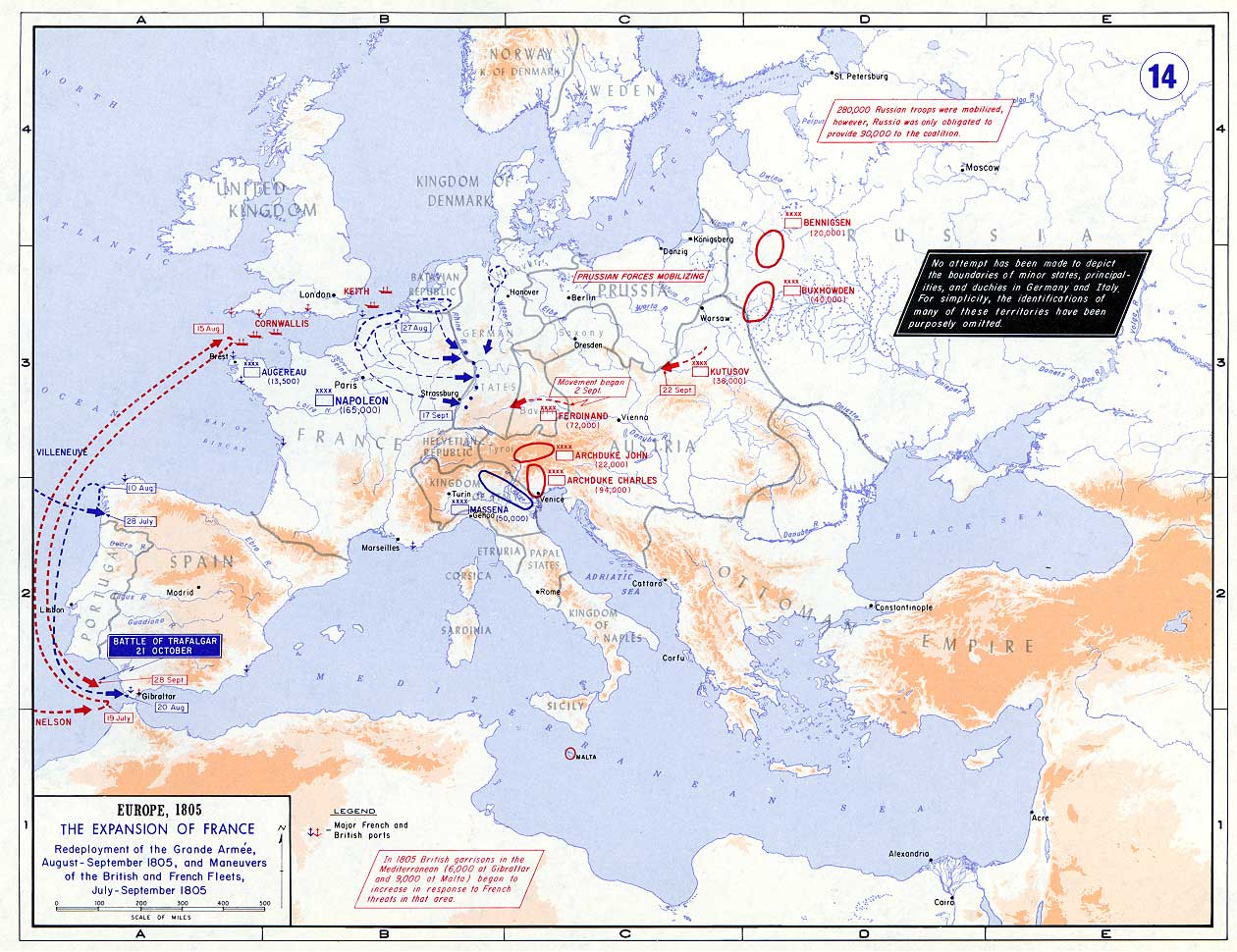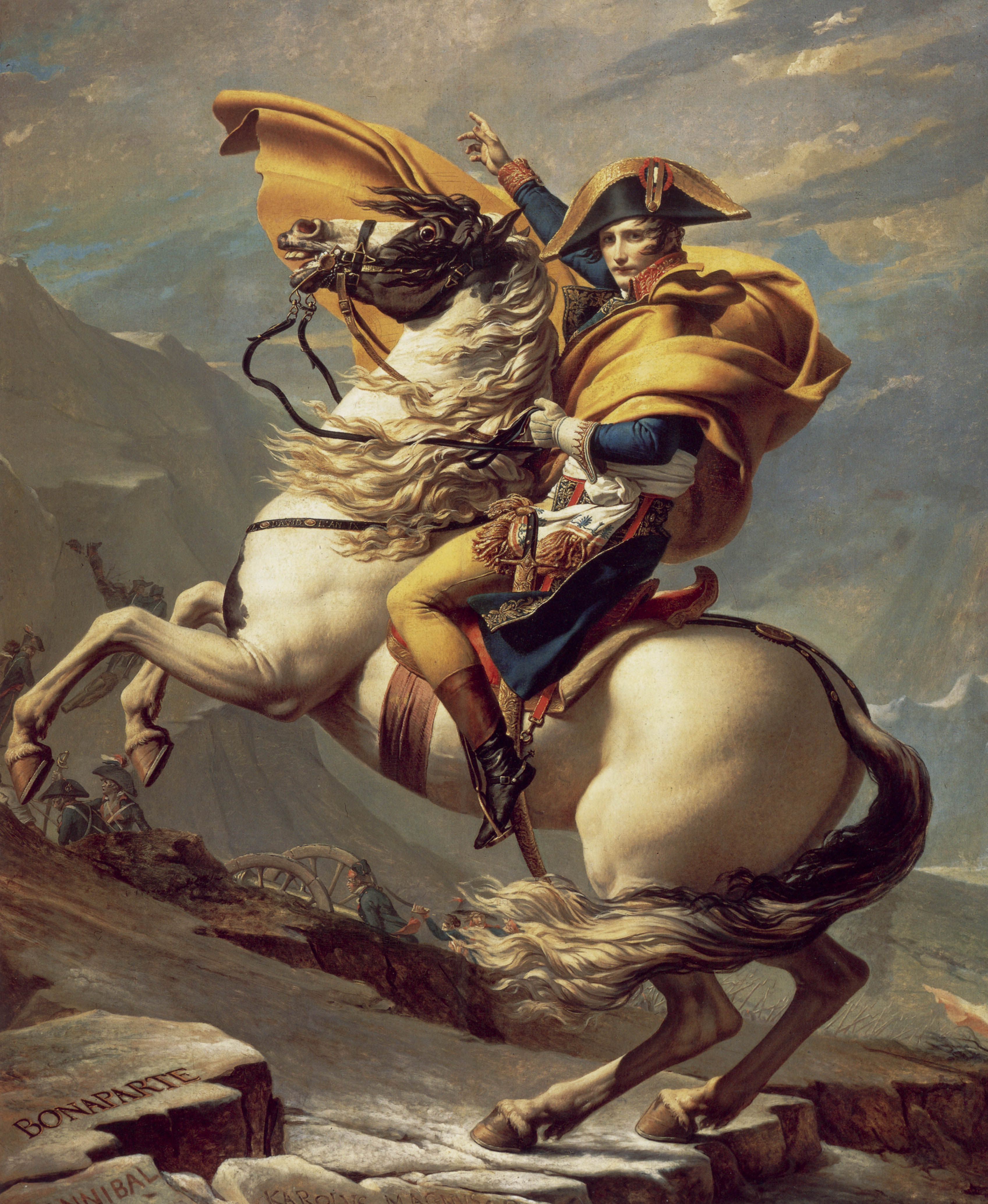|
Joachim Murat
Joachim Murat ( , also ; ; ; 25 March 1767 – 13 October 1815) was a French Army officer and statesman who served during the French Revolutionary and Napoleonic Wars. Under the French Empire he received the military titles of Marshal of the Empire and Admiral of France. He was the first Prince Murat, Grand Duke of Berg from 1806 to 1808, and King of Naples as Joachim-Napoleon () from 1808 to 1815. Born in Labastide-Fortunière in southwestern France, Murat briefly pursued a vocation in the clergy before enlisting in a cavalry regiment upon the outbreak of the French Revolution. Murat distinguished himself under the command of General Napoleon Bonaparte on 13 Vendémiaire (1795), when he seized a group of large cannons and was instrumental in suppressing the royalist insurrection in Paris. He became Napoleon's aide-de-camp and commanded the cavalry during the French campaigns in Italy and Egypt. Murat played a pivotal role in the Coup of 18 Brumaire (1799), which brough ... [...More Info...] [...Related Items...] OR: [Wikipedia] [Google] [Baidu] |
Marshal Of The Empire
Marshal of the Empire () was a civil dignity during the First French Empire. It was established by on 18 May 1804 and to a large extent reinstated the formerly abolished title of Marshal of France. According to the ''Sénatus-consulte'', a Marshal was a grand officer of the Empire, entitled to a high-standing position at the court and to the presidency of an electoral college. Although in theory reserved "to the most distinguished generals", in practice Emperor of the French, Emperor Napoleon granted the title according to his own wishes and convictions and made at least a few controversial choices. Although not a military rank, a Marshal displayed four silver stars, while the top military rank, General of Division, displayed three stars. Furthermore, the Marshalate quickly became the prestigious sign of the supreme military attainment and it became customary that the most significant commands be given to a Marshal. Each Marshal held his own coat of arms, was entitled to specia ... [...More Info...] [...Related Items...] OR: [Wikipedia] [Google] [Baidu] |
War Of The First Coalition
The War of the First Coalition () was a set of wars that several European powers fought between 1792 and 1797, initially against the Constitutional Cabinet of Louis XVI, constitutional Kingdom of France and then the French First Republic, French Republic that succeeded it. They were only loosely allied and fought without much apparent coordination or agreement; each power had its eye on a different part of France it wanted to appropriate after a French defeat, which never occurred. Shusterman, Noah (2015). ''De Franse Revolutie (The French Revolution)''. Veen Media, Amsterdam. (Translation of: ''The French Revolution. Faith, Desire, and Politics''. Routledge, London/New York, 2014.) Chapter 7, pp. 271–312: The federalist revolts, the Vendée and the beginning of the Terror (summer–fall 1793). Relations between the French revolutionaries and neighbouring monarchies had deteriorated following the Declaration of Pillnitz in August 1791. Eight months later, Louis XVI and the Leg ... [...More Info...] [...Related Items...] OR: [Wikipedia] [Google] [Baidu] |
War Of The Sixth Coalition
In the War of the Sixth Coalition () (December 1812 – May 1814), sometimes known in Germany as the Wars of Liberation (), a coalition of Austrian Empire, Austria, Kingdom of Prussia, Prussia, Russian Empire, Russia, History of Spain (1808–1874), Spain, the United Kingdom of Great Britain and Ireland, United Kingdom, History of Portugal (1777–1834), Portugal, Sweden, Kingdom of Sardinia (1720–1861), Sardinia, and a number of Confederation of the Rhine, German States defeated First French Empire, France and drove Napoleon into exile on Elba. After the disastrous French invasion of Russia of 1812 in which they had been forced to support France, Prussia and Austria joined Russia, the United Kingdom, Sweden, and Portugal, and the Peninsula War, rebels in Spain who were already at war with France. The War of the Sixth Coalition saw battles at Battle of Lützen (1813), Lützen, Battle of Bautzen (1813), Bautzen, and Battle of Dresden, Dresden. The even larger Battle of Leipzi ... [...More Info...] [...Related Items...] OR: [Wikipedia] [Google] [Baidu] |
French Occupation Of Moscow
French Emperor Napoleon Bonaparte's occupied Moscow from 14 September to 19 October 1812 during the Napoleonic Wars. It marked the summit of the French invasion of Russia. During the occupation, which lasted 36 days, the city was devastated by fire and looted by both Russian peasants and the French. Napoleon's invasion of Russia began on the 24th of June in 1812, and he had made considerable progress by autumn. With French victory in the Battle of Borodino on 7 September, the way to Moscow was open. The opposing Russian army under Mikhail Kutuzov had suffered heavy losses and chose to retreat. A week of close escapes on the part of the Russian army followed. Napoleon and Kutuzov even slept on the same bed in the manor of Bolshiye Vyazyomy just one night apart, as the French chased the Russians down. Napoleon and his army entered Moscow on 14 September. To Napoleon's surprise, Kutuzov had abandoned the city, and it fell without a fight. Hundreds of thousands of civilians fl ... [...More Info...] [...Related Items...] OR: [Wikipedia] [Google] [Baidu] |
Battle Of Borodino
The Battle of Borodino ( ) or Battle of Moscow (), in popular literature also known as the Battle of the Generals, took place on the outskirts of Moscow near the village of Borodino on 7 September 1812 during Napoleon's invasion of Russia. The ' fought against the Imperial Russian Army. After the Russian retreat in the Battle of Smolensk the road to Moscow lay open. Napoleon fought against General Mikhail Kutuzov, whom the Emperor Alexander I had appointed to replace Barclay de Tolly on 29 August 1812 after Smolensk was razed and captured by the French army. After the Battle of Borodino, Napoleon remained on the battlefield with his army; the Imperial Russian forces retreated southwards. What followed was the French occupation of Moscow, while the retreating Russians resorted to scorched earth tactics to trap Napoleon and his men within their own largest city. The failure of the ' to completely destroy the Imperial Russian army, and in particular Napoleon's reluctance to ... [...More Info...] [...Related Items...] OR: [Wikipedia] [Google] [Baidu] |
French Invasion Of Russia
The French invasion of Russia, also known as the Russian campaign (), the Second Polish War, and in Russia as the Patriotic War of 1812 (), was initiated by Napoleon with the aim of compelling the Russian Empire to comply with the Continental System, continental blockade of the United Kingdom. Widely studied, Napoleon's incursion into Russia stands as a focal point in military history, recognized as among the list of battles by casualties, most devastating military endeavors globally. In a span of fewer than six months, the campaign exacted a staggering toll, claiming the lives of nearly a million soldiers and civilians. On 24 June 1812 and subsequent days, the initial wave of the multinational Grande Armée crossed the Neman River, marking the entry from the Duchy of Warsaw into Russia. Employing extensive forced marches, Napoleon rapidly advanced his army of nearly half a million individuals through European Russia, Western Russia, encompassing present-day Belarus, in a b ... [...More Info...] [...Related Items...] OR: [Wikipedia] [Google] [Baidu] |
Battle Of Eylau
The Battle of Eylau (also known as the Battle of Preussisch-Eylau) was a bloody and strategically inconclusive battle on 7 and 8 February 1807 between Napoleon's and the Imperial Russian Army under the command of General Levin August von Bennigsen near the town of Bagrationovsk, Preussisch Eylau in East Prussia. Late in the battle, the Russians received timely reinforcements from a Kingdom of Prussia, Prussian division of Anton Wilhelm von L'Estocq, von L'Estocq. After 1945, the town was renamed Bagrationovsk as part of Kaliningrad Oblast, Russia. The engagement was fought during the War of the Fourth Coalition, part of the Napoleonic Wars. Napoleon's armies had smashed the army of the Austrian Empire in the Ulm Campaign and the combined Austrian and Russian armies at the Battle of Austerlitz on 2 December 1805. On 14 October 1806, Napoleon crushed the armies of the Kingdom of Prussia at the Battle of Jena–Auerstedt and hunted down the scattered Prussians at Battle of Pren ... [...More Info...] [...Related Items...] OR: [Wikipedia] [Google] [Baidu] |
Battle Of Jena
A battle is an occurrence of combat in warfare between opposing military units of any number or size. A war usually consists of multiple battles. In general, a battle is a military engagement that is well defined in duration, area, and force commitment. An engagement with only limited commitment between the forces and without decisive results is sometimes called a skirmish. The word "battle" can also be used infrequently to refer to an entire operational campaign, although this usage greatly diverges from its conventional or customary meaning. Generally, the word "battle" is used for such campaigns if referring to a protracted combat encounter in which either one or both of the combatants had the same methods, resources, and strategic objectives throughout the encounter. Some prominent examples of this would be the Battle of the Atlantic, Battle of Britain, and the Battle of France, all in World War II. Wars and military campaigns are guided by military strategy, whereas ... [...More Info...] [...Related Items...] OR: [Wikipedia] [Google] [Baidu] |
War Of The Fourth Coalition
The War of the Fourth Coalition () was a war spanning 1806–1807 that saw a multinational coalition fight against Napoleon's First French Empire, French Empire, subsequently being defeated. The main coalition partners were Kingdom of Prussia, Prussia and Russian Empire, Russia with Electorate of Saxony, Saxony, Franco-Swedish War, Sweden, and United Kingdom of Great Britain and Ireland, Great Britain also contributing. Excluding Prussia, some members of the coalition had previously been fighting France as part of the War of the Third Coalition, Third Coalition, and there was no intervening period of general peace. On 9 October 1806, Prussia declared war on France and joined a renewed coalition, fearing the rise in French power after the defeat of Austrian Empire, Austria and establishment of the French-sponsored Confederation of the Rhine in addition to having learned of French plans to cede Prussian-desired Electorate of Hanover, Hanover to Britain in exchange for peace. Prussi ... [...More Info...] [...Related Items...] OR: [Wikipedia] [Google] [Baidu] |
Battle Of Austerlitz
The Battle of Austerlitz (2 December 1805/11 Frimaire An XIV French Republican calendar, FRC), also known as the Battle of the Three Emperors, was one of the most important military engagements of the Napoleonic Wars. The battle occurred near the town of Slavkov u Brna, Austerlitz in the Austrian Empire (now Slavkov u Brna in the Czech Republic). Around 158,000 troops were involved, of which around 24,000 were killed or wounded. The battle is often cited by military historians as one of Napoleon's tactical masterpieces, in the same league as other historic engagements like Hannibal's Battle of Cannae, Cannae (216 BC) or Alexander the Great's Battle of Gaugamela, Gaugamela (331 BC).Byron Farwell, Farwell p. 64. "Austerlitz is generally regarded as one of Napoleon's tactical masterpieces and has been ranked as the equal of Arbela, Cannae, and Leuthen."Trevor N. Dupuy, Dupuy p. 102 Note: Dupuy was not afraid of expressing an opinion, and he classified some of his subjects as Great ... [...More Info...] [...Related Items...] OR: [Wikipedia] [Google] [Baidu] |
War Of The Third Coalition
The War of the Third Coalition () was a European conflict lasting from 1805 to 1806 and was the first conflict of the Napoleonic Wars. During the war, First French Empire, France and French client republic, its client states under Napoleon I and its ally Spain opposed an alliance, the Third Coalition, which was made up of the United Kingdom of Great Britain and Ireland, United Kingdom, the Austrian Empire, the Russian Empire, Kingdom of Naples, Naples, Kingdom of Sicily, Sicily, and Sweden. Kingdom of Prussia, Prussia remained neutral during the war. Britain had already been at war with France following the breakdown of the Treaty of Amiens, Peace of Amiens and remained the only country still at war with France after the Treaty of Pressburg (1805), Treaty of Pressburg. From 1803 to 1805, Britain stood under constant threat of a Napoleon's planned invasion of the United Kingdom, French invasion. The Royal Navy, however, assured its naval dominance at the Battle of Trafalgar in Oc ... [...More Info...] [...Related Items...] OR: [Wikipedia] [Google] [Baidu] |
Battle Of Marengo (1800)
The Battle of Marengo was fought on 14 June 1800 between French First Republic, French forces under the First Consul Napoleon Bonaparte and Austrian Empire, Austrian forces near the city of Alessandria, in Piedmont, Italy. Near the end of the day, the French overcame General Michael von Melas's surprise attack, drove the Austrians out of Italy and consolidated Bonaparte's political position in Paris as First Consul of France in the wake of Coup of 18 Brumaire, his coup d'état the previous November. Surprised by the Austrian advance toward Genoa in mid-April 1800, Bonaparte hastily led his army over the Alps in mid-May and reached Milan on 2 June. After cutting Melas's line of communications by crossing the river Po (river), Po and defeating ''Feldmarschallleutnant'' (FML) Peter Karl Ott von Bátorkéz at Battle of Montebello (1800), Montebello on 9 June, the French closed in on the Austrian Army, which had massed in Alessandria. Deceived by a local double agent, Bonaparte ... [...More Info...] [...Related Items...] OR: [Wikipedia] [Google] [Baidu] |












